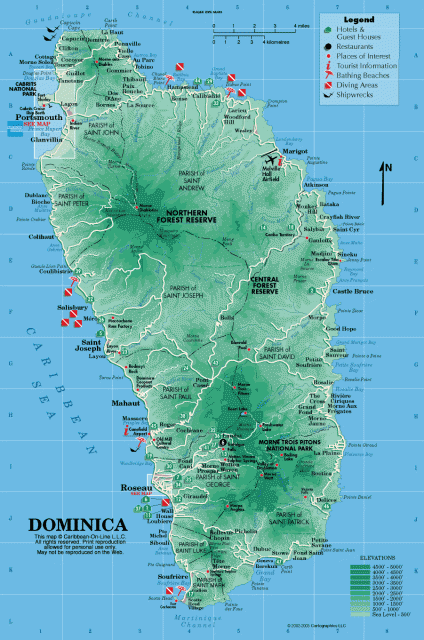Dominica
Area 294 square mi (754 square km)
Population 72,340 2014
Capital Roseau
Highest Point Morne Diablatins 4,775 ft (1,447 m)
Lowest Point 0 m
GDP $537.8 million 2014
Primary Natural Resources timber, hydropower.
THE LAST OF THE islands of the West Indies to be colonized, chiefly because of the fierce resistance of the native Carib population, the island of Dominica now retains the only pre-Columbian population in the eastern CARIBBEAN SEA. Dominica also maintains more of its original tropical vegetation, due to the roughness of its terrain—it is 66 percent forested, compared to 36 percent on SAINT VINCENT, and only 9 percent on GRENADA. The inability to establish large plantations thus served to preserve Dominica's natural riches, a fact that is now a blessing to the country's economy as a chief draw for tourism, supplemented by reserves of timber for export.

As with the other islands in the Windward group of the Antilles, Dominica is volcanic in origin. Morne Diablatins is the island's highest volcanic peak, but there is also considerable thermal activity and a large crater lake located only 7 mi (11 km) from the capital city of Roseau. The Caribs (approximately 3,000 in number) live mostly in a reservation set up for them in the northeastern part of the island. Many still farm small plots and are involved in weaving traditional baskets used all over the island and sold to tourists. Having richer and more luxuriant soil than its neighbors, Dominica grows most tropical products with ease but specializes in limes.
The island, named by Christopher Columbus on Sunday (Domingo), November 3, 1493, lies between the French departments of GUADELOUPE and MARTINIQUE and was itself a French colony until 1763. Among those many North American and Caribbean territories reassigned to the British by the Treaty of Paris, Dominica remained a British colony until independence in 1978.
Because of Carib resistance and the steepness of its volcanic slopes, Dominica was not developed as a major sugar producer like its neighbors. Small farmers continued to live much as they had done before the British takeover, and the island retains much of its French flavor, especially in its patois. Possibly as a result of this duality of loyalties, Dominica has chosen to become a republic while remaining a member of the British Commonwealth—in other words, unlike ANTIGUA or SAINT KITTS, the chief executive of Dominica is an elected president, not the hereditary British monarch. With one of the lowest per capita incomes in the Lesser Antilles, the population is increasingly young and urban, with nearly a third living in the capital of Roseau.